人教版高中英语必修一高一英语练习
人教版高一英语必修第一册 Welcome Unit 单元测试题(含答案)
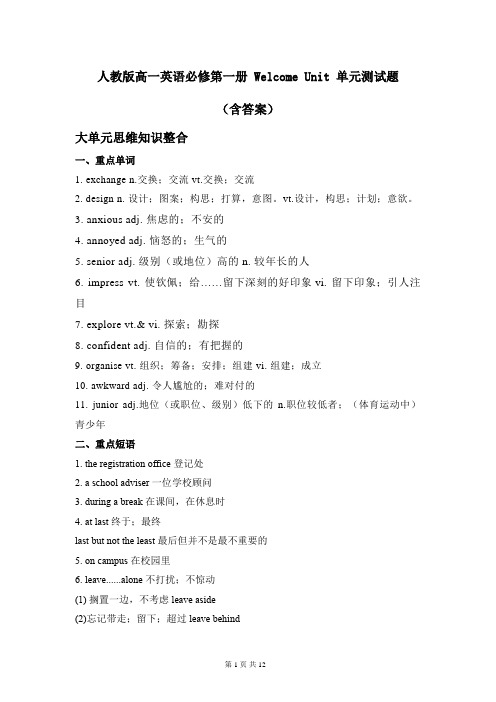
人教版高一英语必修第一册 Welcome Unit 单元测试题(含答案)大单元思维知识整合一、重点单词1. exchange n.交换;交流 vt.交换;交流2. design n. 设计;图案;构思;打算,意图。
vt.设计,构思;计划;意欲。
3. anxious adj. 焦虑的;不安的4. annoyed adj. 恼怒的;生气的5. senior adj. 级别(或地位)高的 n. 较年长的人6. impress vt. 使钦佩;给……留下深刻的好印象 vi. 留下印象;引人注目7. explore vt.& vi. 探索;勘探8. confident adj. 自信的;有把握的9. organise vt. 组织;筹备;安排;组建 vi. 组建;成立10. awkward adj. 令人尴尬的;难对付的11. junior adj.地位(或职位、级别)低下的n.职位较低者;(体育运动中)青少年二、重点短语1. the registration office 登记处2. a school adviser 一位学校顾问3. during a break 在课间,在休息时4. at last 终于;最终last but not the least 最后但并不是最不重要的5. on campus 在校园里6. leave......alone 不打扰;不惊动(1) 搁置一边,不考虑 leave aside(2)忘记带走;留下;超过 leave behind(3)动身去 leave for(4)遗漏,省去;忽视;冷落 leave out 7. fill in 填写8. find sb./sth +adj 发现某人/某事怎么样9. look forward to... 盼望;期待......(1)回顾,回忆起 look back on...(2)轻视,瞧不起 look down on...(3)仰慕,尊敬 look up to...(4)注意,当心,留意 look out for...10. at the same time 同时11. come true 实现12. come out 出现,出版,开花结果13. take notes 记笔记(1)做笔记,记录 take notes of ...(2)注意;留意 take note of...(3)交换意见 compare notes14. make plans 做计划15. write down 写下......16. either......or......不是......就是......17. be busy with sth /doing sth 忙于做某事18. show sth to sb 给某人展示某物三、重点句型1. make it+adj./n.+(for sb.) to do sth.2. recommend that ... (should) do3. so that引导目的状语从句4. 疑问词+to do四、重点用法1. What if......? 要是......会怎么样呢?(1)假如你失败了,该怎么办呢?What if you fail?(2)我没有带伞。
人教版高中英语选择性必修第一册UNIT1 Section Ⅰ练习含答案

UNIT 1PEOPLE OF ACHIEVEMENT SectionⅠReading and Thinking课后·训练提升一、单词拼写.It is necessary to hold an o attitude towards ratings..Normally,water b at 100 degrees centigrade..As is known to all,most matter has three states:solid,l and gas..It is widely a that the film is instructive and full of emotion..Last month they were d again after so many defeats..At the meeting,he also i that they should give enough space for children.(science) research.naming his little brother Horace.’t say anything.(apparent),he was a man of few words.(teach),not research.(object) opinion on this.your survival on this island.(acknowledge) of their timely help.conclusion,I would like to say the film is worth seeing.(analyse) the data.10.(boil) water is good for your health while some soft drinks will do harm to1.个体经营者要准确记录账目,这十分重要。
新人教版高一英语必修1全册配套完整练习集
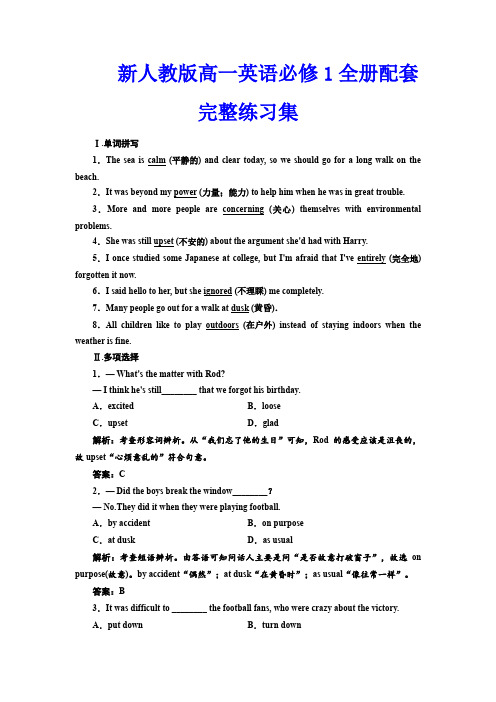
新人教版高一英语必修1全册配套完整练习集Ⅰ.单词拼写1.The sea is calm (平静的) and clear today, so we should go for a long walk on the beach.2.It was beyond my power (力量;能力) to help him when he was in great trouble.3.More and more people are concerning (关心) themselves with environmental problems.4.She was still upset (不安的) about the argument she'd had with Harry.5.I once studied some Japanese at college, but I'm afraid that I've entirely (完全地) forgotten it now.6.I said hello to her, but she ignored (不理睬) me completely.7.Many people go out for a walk at dusk (黄昏).8.All children like to play outdoors (在户外) instead of staying indoors when the weather is fine.Ⅱ.多项选择1.— What's the matter with Rod?— I think he's still________ that we forgot his birthday.A.excited B.looseC.upset D.glad解析:考查形容词辨析。
从“我们忘了他的生日”可知,Rod的感受应该是沮丧的,故upset“心烦意乱的”符合句意。
人教版高中英语必修第一册课后习题 Unit 1 Teenage Life Section Ⅲ
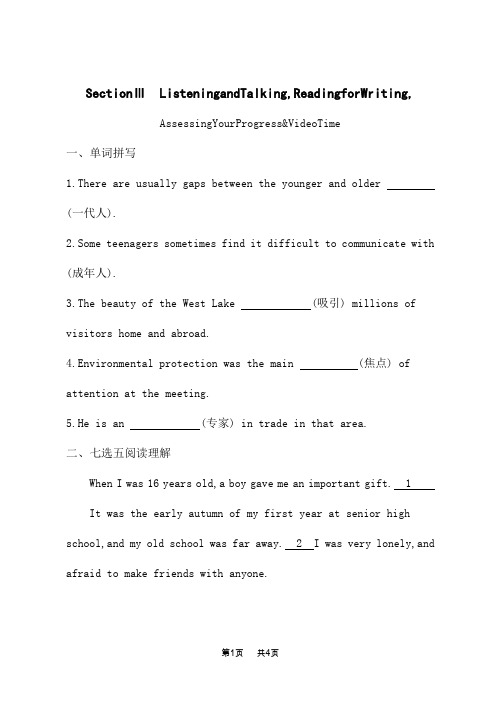
SectionⅢListeningandTalking,ReadingforWriting,AssessingYourProgress&VideoTime一、单词拼写1.There are usually gaps between the younger and older(一代人).2.Some teenagers sometimes find it difficult to communicate with (成年人).3.The beauty of the West Lake (吸引) millions of visitors home and abroad.4.Environmental protection was the main (焦点) of attention at the meeting.5.He is an (专家) in trade in that area.二、七选五阅读理解When I was 16 years old,a boy gave me an important gift. 1It was the early autumn of my first year at senior high school,and my old school was far away. 2 I was very lonely,and afraid to make friends with anyone.Every time I listened to other students talking and laughing,I felt sad.I couldn’t talk with anyone about my problems.And I didn’t want my parents to worry about me.Then one day,my classmates talked happily with their friends,but I sat at my desk unhappily as usual. 3 I didn’t know who he was.He passed me and then turned back.He looked at me,with a smile on his face.Suddenly,I felt the touch of something bright and friendly.It made me feel happy,lively and warm.4 I started to talk with other students and make friends.Day by day,I became closer to everyone in my class.The boy with the lucky smile has become my best friend now!One day,I asked him why he smiled,but he couldn’t remember smiling at me.It doesn’t matter because all the dark days have gone.5 If you think it lonely,you might always be alone.So smile at the world and it will smile back.A.It was a smile.B.That smile changed my life.C.As a result,no one knew who I was.D.He’s living in Australia now and he loves it.E.At that moment,a boy entered the classroom.F.It’s practically impossible to make friends here.G.I believe that the world is what you think it is.三、选词创境选择下列词汇进行写作,自己创设一个体验语境,形成一个小语段。
人教版高中英语必修第一册同步训练UNIT 1 Section Ⅰ 含答案
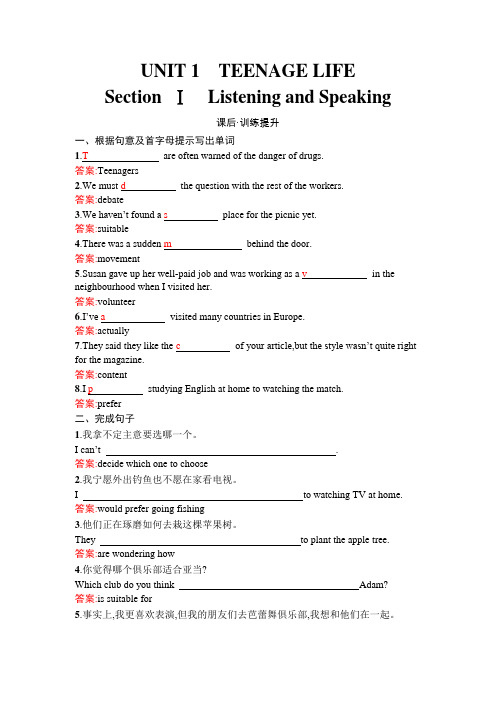
UNIT 1TEENAGE LIFESectionⅠListening and Speaking课后·训练提升一、根据句意及首字母提示写出单词1.T are often warned of the danger of drugs.答案:Teenagers2.We must d the question with the rest of the workers.答案:debate3.We haven’t found a s place for the picnic yet.答案:suitable4.There was a sudden m behind the door.答案:movement5.Susan gave up her well-paid job and was working as a v in the neighbourhood when I visited her.答案:volunteer6.I’ve a visited many countries in Europe.答案:actually7.They said they like the c of your article,but the style wasn’t quite right for the magazine.答案:content8.I p studying English at home to watching the match.答案:prefer二、完成句子1.我拿不定主意要选哪一个。
I ca n’t .答案:decide which one to choose2.我宁愿外出钓鱼也不愿在家看电视。
I to watching TV at home. 答案:would prefer going fishing3.他们正在琢磨如何去栽这棵苹果树。
They to plant the apple tree.答案:are wondering how4.你觉得哪个俱乐部适合亚当?Which club do you think Adam?答案:is suitable for5.事实上,我更喜欢表演,但我的朋友们去芭蕾舞俱乐部,我想和他们在一起。
高一英语人教版必修一随堂练习:Unit+1+Friendship(含答案)

Book 1 Unit 1随堂练习Part One: Warming Up → ComprehendingI. 单词拼写。
1.The snow is __________(松散的),and there is lots of air, so it is not as cold as outside.2.She is so c_________ about music, and she can’t live without it.3.Draw these heavy c_______ back. Let the sunlight in.4.The p_________ of the meeting is to select a new chairman.5.Some drivers simply i________ speed limits, thus causing many traffic accidents (交通事故).6.An express train ________(发出雷鸣声) through the station.7.I need to discuss this with my business p_________.8.She seldom _________ ( 掩藏) her feelings.9. His sudden death u_____ everybody.10. I said hello to her, but she i______ me completely!11. My new trousers are too l_____. I should change a smaller one.12. That book is written in G______.13. A rainstorm usually goes with t______.14. You mistook my meaning e______.15. I am your lucky dance p______.II. 用括号里所给的动词的正确形式填空:1. I got my bike _____ (fix) yesterday.2. While ______(walk) in the street, he met his old friend.3. Don’t let others _____ (look) at your paper.4. You should ____ (visit) your grandpa yesterday.5. ______(make) a list of all the things you need to do.6. In the early 20th century, China ______(go) through too many wars.7. Many Jews _____(catch) by the Nazis during World War II.8. How dare you _____(speak) to your teacher like that9. Recently a series of accidents _____ (happen).10. It is the first time that I _____ (come) here.11. He told me it was the fourth time that he ______(make) the mistake.III. 单词变身lonely (名词) _____________power (形容词)____________German (德国)___________ignore (名词)__________dust(形容词)____________agree(反义词)____________entire (副词) ____________loose (动词) ____________IV. 短语搜索1. 合计 __________________2. 平静下来 _______________3. 关心,挂念________________4.在黄昏时刻_______________5.经历;经受____________6.记下,放下 ______________7.一连串的,一系列的______________8.故意 ____________9.不再 _______________10.为了……;以……为目的 _______________V. 完成句子1. 在听讲座时,你们应该记笔记以备以后讨论。
人教版高中英语必修第一册同步训练UNIT2 Section Ⅰ含答案
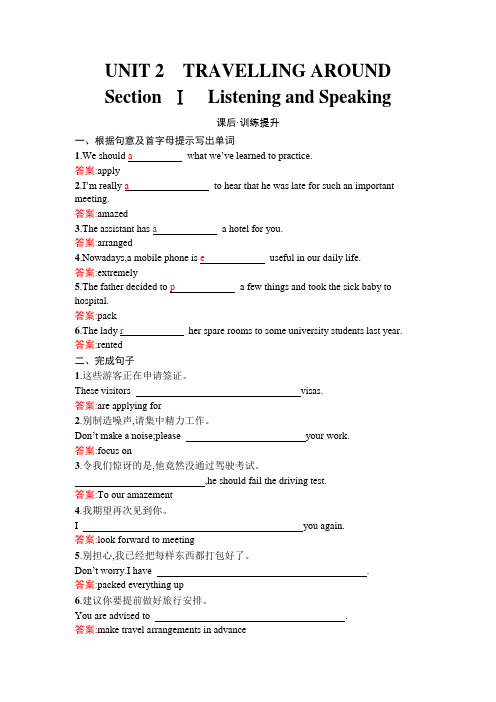
UNIT 2TRAVELLING AROUNDSectionⅠListening and Speaking课后·训练提升一、根据句意及首字母提示写出单词1.We should a what we’ve learned to practice.答案:apply2.I’m really a to hear that he was late for such an important meeting.答案:amazed3.The assistant has a a hotel for you.答案:arranged4.Nowadays,a mobile phone is e useful in our daily life.答案:extremely5.The father decided to p a few things and took the sick baby to hospital.答案:pack6.The lady r her spare rooms to some university students last year. 答案:rented二、完成句子1.这些游客正在申请签证。
These visitors visas.答案:are applying for2.别制造噪声,请集中精力工作。
Don’t make a noise;please your work.答案:focus on3.令我们惊讶的是,他竟然没通过驾驶考试。
,he should fail the driving test.答案:To our amazement4.我期望再次见到你。
I you again.答案:look forward to meeting5.别担心,我已经把每样东西都打包好了。
Don’t worry.I have .答案:packed everything up6.建议你要提前做好旅行安排。
You are advised to .答案:make travel arrangements in advance7.去中国九寨沟的最佳时间是什么时候?What is Jiuzhaigou,China?答案:the best time to visit8.她到达后打算怎么出行?How is she planning to after she arrives?答案:get around三、同义句转换1.He is going to Beijing by plane.→He is going to Beijing .答案:by air2.The girl focused on the homework she was doing.→The girl the homework she was doing.答案:concentrated on3.It was amazing for us to know that Kate refused our help.→We know that Kate refused our help.答案:were amazed4.The tourists hired a car to travel around the city.→The tourists a car to travel around the city.答案:rented四、阅读理解Travelling can be a fun way to gain life experiences,but what if you’re a student and don’t have enough money for a trip?Don’t worry.Here are some useful tips.Save:This probably is the most important preparation for travelling.Cut expenses(花费)to fatten your wallet so you’ll have more choices abo ut where to go and how to get there.Plan ahead:Don’t wait until the last minute to plan your trip.Giving yourself several months to get ready can mean security and savings.Do your homework:No matter where you go,research the places you will visit.Decide what to see.Travel books will provide information on the cheapest hotels and restaurants.Plan sensibly:Write down how much you expect to spend on food and hotels.Stick to(坚持)your plan,or you may not have enough money to cover everything.Travel in groups:Find someone who is interested in visiting the same places.By travelling with others you can share costs and experiences.Work as you go:Need more money to support your trip?Look for work in the places you visit.Go off the beaten path:Tourist cities may be expensive.You may want to rethink about your trip and go to a less known area.Smaller towns can have many interesting activities(活动) and sights.Pack necessary things:The most important things to take are not always clothes.Remember to take along medicine in case you get sick and snacks in case you cannot find a cheap restaurant.By planning sensibly,even students can enjoy their travel.Your travel experiences will be remembered for a lifetime.1.Before your trip,the first thing you should do is.A.to make a plan of the routeB.to get information on the InternetC.to save money by spending lessD.to buy tickets ahead of time答案:C解析:细节理解题。
人教版高一英语必修一Unit1测试题及答案
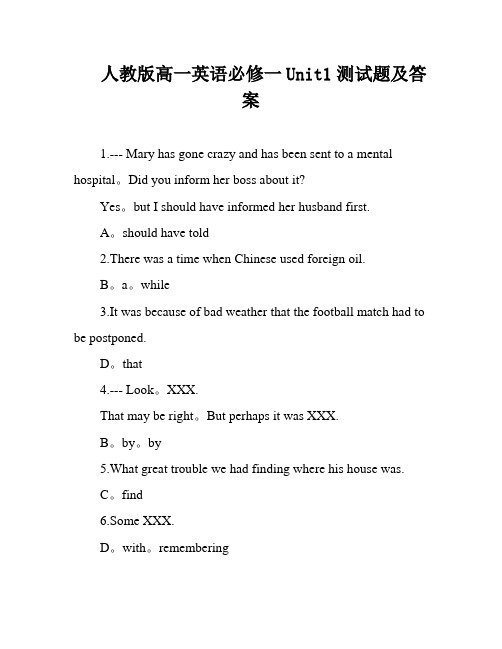
人教版高一英语必修一Unit1测试题及答案1.--- Mary has gone crazy and has been sent to a mental hospital。
Did you inform her boss about it?Yes。
but I should have informed her husband first.A。
should have told2.There was a time when Chinese used foreign oil.B。
a。
while3.It was because of bad weather that the football match had to be postponed.D。
that4.--- Look。
XXX.That may be right。
But perhaps it was XXX.B。
by。
by5.What great trouble we had finding where his house was.C。
find6.Some XXX.D。
with。
remembering7.I cannot spend too much money on the car which is too expensive for me.1.C。
much too。
too muchThe amount of sugar in this recipe is much too high。
We need to ce it to a more reasonable level as too much sugar can be harmful to our health.2.A。
In order toIn order to catch the first bus。
he got up very early this morning。
He didn't want to be late for his appointment.3.B。
人教版高中英语必修第一册同步训练UNIT3 Section Ⅱ 含答案
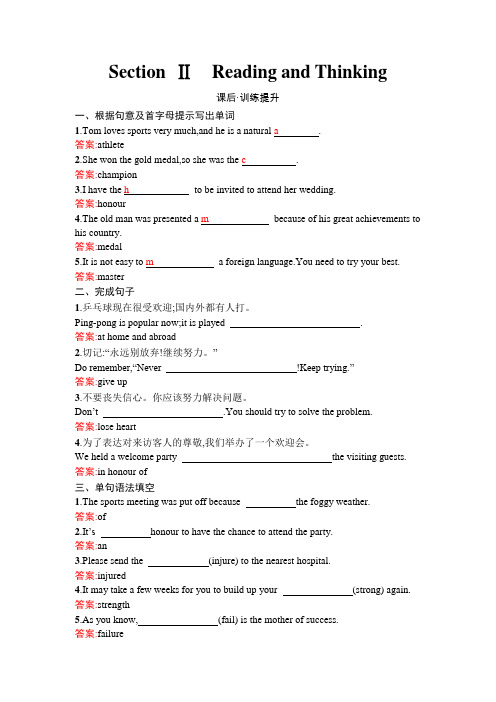
SectionⅡReading and Thinking课后·训练提升一、根据句意及首字母提示写出单词1.Tom loves sports very much,and he is a natural a.答案:athlete2.She won the gold medal,so she was the c.答案:champion3.I have the h to be invited to attend her wedding.答案:honour4.The old man was presented a m because of his great achievements to his country.答案:medal5.It is not easy to m a foreign language.You need to try your best.答案:master二、完成句子1.乒乓球现在很受欢迎;国内外都有人打。
Ping-pong is popular now;it is played .答案:at home and abroad2.切记:“永远别放弃!继续努力。
”Do remember,“Never !Keep trying.”答案:give up3.不要丧失信心。
你应该努力解决问题。
Don’t .You should try to solve the problem.答案:lose heart4.为了表达对来访客人的尊敬,我们举办了一个欢迎会。
We held a welcome party the visiting guests. 答案:in honour of三、单句语法填空1.The sports meeting was put off because the foggy weather.答案:of2.It’s honour to have the chance to attend the party.答案:an3.Please send the (injure) to the nearest hospital.答案:injured4.It may take a few weeks for you to build up your (strong) again. 答案:strength5.As you know,(fail) is the mother of success.答案:failure6.In fact,these old scientists brought glory our country when they were young.答案:to7.Thomas,my close friend,is a young man with great (determine).答案:determination四、阅读理解When school started on that warm August day,I threw myself into everything I did,including playing volleyball.I decided to become beautiful,or at the veryleast,skinny.I stopped eating completely.Soon I began losing weight,which thrilled me,and I even grew to love the tiredness and light headedness that came with my poor diet,for those feelings meant that I was winning.As the season progressed,things had become tense between my head volleyball coach,Coach Smith,and me.She felt that something was wrong with my health.She talked with me about my eating and was angry that I wouldn’t listen to her when she tried to make me eat.She tried to persuade me in a determined way and so we fought constantly.Then my hunger started to affect my performance.I was so tired that practice and games were becoming a struggle.One afternoon,with hurt in hereyes,Coach Smith asked me what I had eaten and I told her nothing yet,but I was going to.She looked at me,disappointment in her eyes,knowing she couldn’t make me stop,and walked away.A couple of weeks later I attended a formal dinner for our volleyball team.I stood there as my coach managed to say something nice about me.I realised then that I had ruined my senior year by being disrespectful,and I had probably ruined hers as well.So that evening I wrote her a letter apologising and thanking her.Then one Saturday,as I was reading in the library,I felt someone gently take my arm and say softly,“Lynn Jones,how are you doing?” I looked up and saw the familiar face.“Thanks for the letter,” she said.“It meant a lot.”When I think of a coach,I think of someone above me,someone who gives instructions—not a friend.But Coach Smith is different,and,like any other good friend,she dealt with my problem in a determined way even when I hated her for it at that time.I didn’t deserve her kindness,but she gave it anyway.I will forever be grateful for her help,and now for her friendship.1.How did the author feel when she had a sense of tiredness?A.Ashamed.B.Proud.C.Funny.D.Nervous.答案:B解析:推理判断题。
人教版高一英语必修一 Unit1同步练习题 含答案
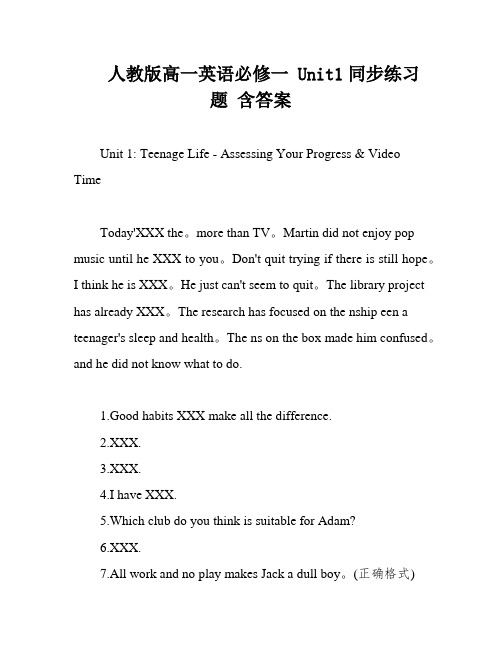
人教版高一英语必修一 Unit1同步练习题含答案Unit 1: Teenage Life - Assessing Your Progress & VideoTimeToday'XXX the。
more than TV。
Martin did not enjoy pop music until he XXX to you。
Don't quit trying if there is still hope。
I think he is XXX。
He just can't seem to quit。
The library project has already XXX。
The research has focused on the nship een a teenager's sleep and health。
The ns on the box made him confused。
and he did not know what to do.1.Good habits XXX make all the difference.2.XXX.3.XXX.4.I have XXX.5.Which club do you think is suitable for Adam?6.XXX.7.All work and no play makes Jack a dull boy。
(正确格式)8.I will have to get used to being responsible for a lot more。
(改写)9.Studying hard XXX(改写)XXX to the。
(正确格式)1.adult①Noun: a person over 18 years old according to British law.②Adjective: XXX.2.XXX①Noun: a person who has a high level of skill or knowledge in a particular area.②Adjective: having a high level of XXX.四、根据提示及语境完成下列短文。
新课标(人教版)高一英语必修一课文详解及练习(附答案)
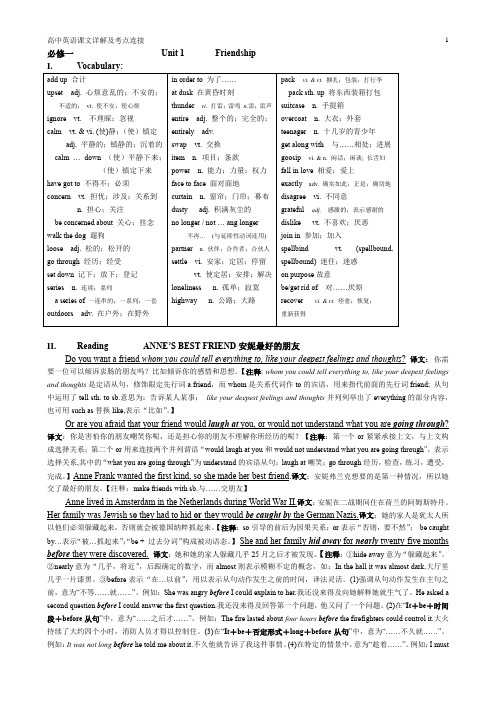
必修一Unit 1 FriendshipII.Reading ANNE’S BEST FRIEND安妮最好的朋友Do you want a friend whom you could tell everything to, like your deepest feelings and thoughts? 译文:你需要一位可以倾诉衷肠的朋友吗?比如倾诉你的感情和思想。
【注释: whom you could tell everything to, like your deepest feelings and thoughts是定语从句,修饰限定先行词a friend,而whom是关系代词作to的宾语,用来指代前面的先行词friend; 从句中运用了tell sth. to sb.意思为:告诉某人某事;like your deepest feelings and thoughts并列列举出了everything的部分内容,也可用such as替换like,表示“比如”。
】Or are you afraid that your friend would laugh at you, or would not understand what you are going through? 译文:你是害怕你的朋友嘲笑你呢,还是担心你的朋友不理解你所经历的呢?【注释:第一个or紧紧承接上文,与上文构成选择关系;第二个or用来连接两个并列谓语“would laugh at you和would not understand what you are going through”,表示选择关系,其中的“what you are going through”为understand的宾语从句;laugh at嘲笑;go through经历,检查,练习,遭受,完成。
】Anne Frank wanted the first kind, so she made her best friend.译文:安妮弗兰克想要的是第一种情况,所以她交了最好的朋友。
人教版高一英语必修1全册同步练习
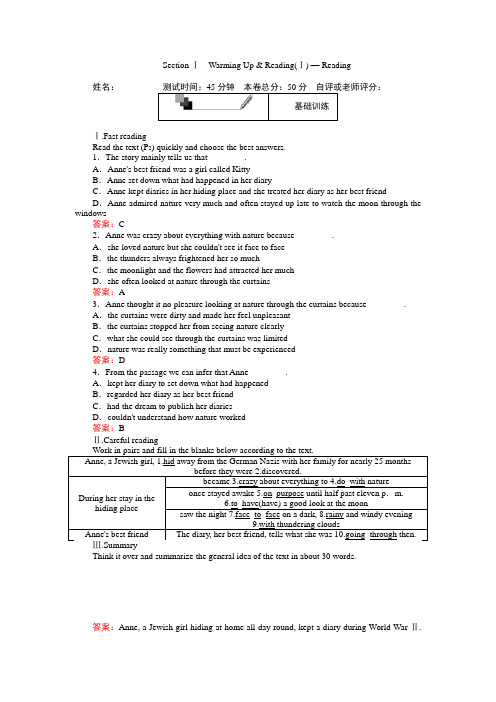
分钟本卷总分:She regarded the diary as her best friend, in which she revealed her desire for a normal life.语篇提能C.fishing D.riding16.A.new B.goodC.amazed D.quick17.A.before B.afterC.when D.since18.A.office B.studyC.hospital D.company19.A.sent B.lentC.taken D.carried20.A.strength B.kindnessC.curiosity D.spirit答案:本文是一篇夹叙夹议文,叙述了“我”在医院与一位病人之间的故事。
1.解析:联系下文内容可知,作者在医院工作。
答案:D2.解析:根据第二段内容可知,此处表示作者经常与情绪糟糕的病人谈话。
答案:A3.解析:一位年轻的女士尽管在那时看起来(气色)不是那么差,但她的病情预断非常糟糕。
故选B。
此处that是一个副词,相当于so。
答案:B4.解析:分析句子结构可知,此处是it作形式主语,真正的主语是that引导的从句。
答案:A5.解析:当“我”进去要和她交谈时,显然她正在考虑要自杀。
下文中的“she seemed to be killing herself”是提示。
故选B。
答案:B6.解析:也许你现在正在寻找的是某种平静。
peace意为“平静,宁静”。
答案:A7.解析:分析前面一句话可知,作者又一次附加了“maybe”这个词。
故选C。
答案:C8.解析:“我”不会详细描述所有的细节,但她的态度有了让人难以臵信的好转。
go into意为“详细描述,详细解释”。
答案:C9.解析:“我”想“我”起了点作用。
help意为“帮助,帮忙”。
答案:A10.解析:但是她确实(really)想过要自杀。
A项意为“最后”;B项意为“完全地”;C项意为“大部分”;D项意为“的确,真的,确实”。
人教版高中英语必修第一册(高一)Unit 1 测试题(含答案)
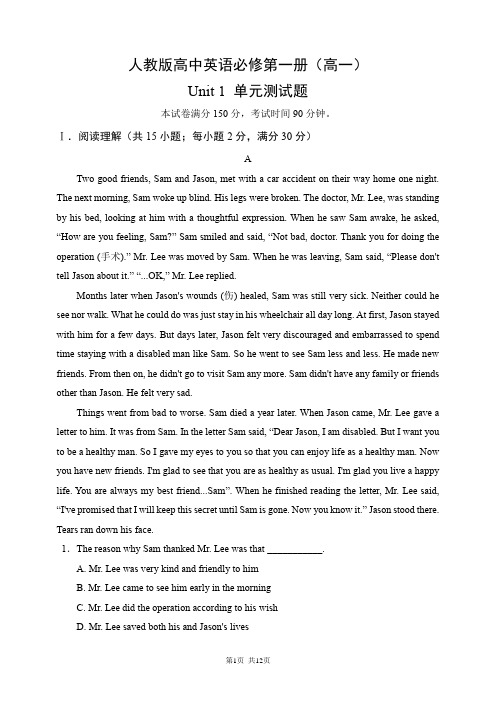
人教版高中英语必修第一册(高一)Unit 1 单元测试题本试卷满分150分,考试时间90分钟。
Ⅰ.阅读理解(共15小题;每小题2分,满分30分)ATwo good friends, Sam and Jason, met with a car accident on their way home one night. The next morning, Sam woke up blind. His legs were broken. The doctor, Mr. Lee, was standing by his bed, looking at him with a thoughtful expression. When he saw Sam awake, he asked, “How are you feeling, Sam?” Sam smiled and said, “Not bad, doctor. Thank you for doing the operation (手术).” Mr. Lee was moved by Sam. When he was leaving, Sam said, “Please don't tell Jason about it.” “...OK,” Mr. Lee replied.Months later when Jason's wounds (伤) healed, Sam was still very sick. Neither could he see nor walk. What he could do was just stay in his wheelchair all day long. At first, Jason stayed with him for a few days. But days later, Jason felt very discouraged and embarrassed to spend time staying with a disabled man like Sam. So he went to see Sam less and less. He made new friends. From then on, he didn't go to visit Sam any more. Sam didn't have any family or friends other than Jason. He felt very sad.Things went from bad to worse. Sam died a year later. When Jason came, Mr. Lee gave a letter to him. It was from Sam. In the letter Sam said, “Dear Jason, I am disabled. But I want you to be a healthy man. So I gave my eyes to you so that you can enjoy life as a healthy man. Now you have new friends. I'm glad to see that you are as healthy as usual. I'm glad you live a happy life. You are always my best friend...Sam”. When he finished reading the letter, Mr. Lee said, “I've promised that I will keep this secret until Sam is gone. Now you know it.” Jason stood there. Tears ran down his face.1.The reason why Sam thanked Mr. Lee was that ___________.A. Mr. Lee was very kind and friendly to himB. Mr. Lee came to see him early in the morningC. Mr. Lee did the operation according to his wishD. Mr. Lee saved both his and Jason's lives2.Which of the following happened according to the order of time?a. Jason made new friends.b. Sam gave his eyes to Jason.c. Sam and Jason were caught in a car accident.d. Sam was disabled and needed friends.e. Sam died and Jason knew the truth.A. d-a-c-b-eB. d-c-b-e-aC. c-b-d-a-eD. c-d-b-e-a3.We can infer from the passage that ___ .A. Sam drove too badly and caused the car accidentB. the unsuccessful operation led to Sam's blindnessC. Jason knew how Sam helped him before Sam diedD. it was Jason that became blind in the car accidentBIt was a terribly rainy wet winter day. While I was walking from the library after getting my university applications (申请) for the next year at the end of my lunch break,a man was walking towards me with two huge boxes of brochures (小册子).I thought, “What on earth is that man trying to do? Carry all those things?” Then all of a sudden he dropped them all! It was a terrible mess with hundreds of brochures all over the path in front of me! “Oh, no,” I thought. The man sat down and started trying to pick all of the brochures up. I couldn't believe how many people passed by without even caring at all.I thought, “I'm not going to be one of those people who don't care about this man. I'm going to help him.” So, even though it was the end of my lunch break from work and I would be late if I stopped to help him, I didn't mind. If I explained what happened, I was sure my boss wouldn't mind too much. So, I helped him pick them all up. Then I asked if he would like a hand in carrying a box to where he went. He said yes gratefully.I carried one of the heavy boxes. The box I had to carry was very heavy—as I'm quite a petite (娇小的) girl but I didn't complain. I just helped him with a big smile across my face. We got there and he thanked me very much for helping him out. He also gave me one of these lovely brochures about all the walks in and around the Bay of Plenty.What is a better way to spend my lunchtime than helping someone? Luckily, I wasn't eventhat late back to work, so nobody minded at all!4.The author was surprised that ____________.A. many people wouldn't help the manB. the man carried two large boxes of brochuresC. the brochures fell down to the groundD. many people picked up the brochures and went away5.In the author's opinion,if she helped the man she would ____________.A. miss her lunchB. arrive late for workC. be asked to pay for the brochuresD. be asked to carry a box of brochures 6.How did the man thank the author?A. He invited her for a walk.B. He wrote her a thankyou letter.C. He offered her a brochure.D. He smiled a big smile at her.7.Which of the following opinions does the author agree with?A. Never laugh at others.B. Carrying something light is wise.C. Never speak with a stranger.D. Helping others is much fun.CEverybody in this world is different from one another. But do you know that understanding differences can help you better manage your money?As we grow up, we gradually develop a set of our own values or beliefs. These are influenced by society, our family, the education we receive and so on. Once this value system is set up, it's not easy to change later in life.Financial experts say that everyone also has their own belief of how to manage their finances. This is part of our value system and it has a great impact on the way we look after our money.According to our different values, experts put us in three categories. They are: the ant, the cricket and the snail.The ant—works firstJust like ants who work heart and soul in summer in order to store food for winter, these people don't care about enjoying the moment. They work very hard and save money they earn so that they can enjoy life when they get old and retire. The ant loves to save but they could makemore out of their money if they were willing to invest (投资) in some funds and stocks with low risk.The cricket—fun firstThe cricket wants to enjoy everything now and doesn't think too much about the future. They even borrow money when they really want something. Many young people now belong to this group. These people have little savings. When they get old,they might have problems. They should learn to save and buy insurance.The snail—lives under pressureThe snail refers to people who make life difficult for themselves. They take big longterm loans (贷款) from the bank in order to buy things such as luxury (奢华的) houses. They are happy to take big loans even though they are not sure whether they can afford it. This can cause problems in the future. They should plan more carefully.8.People with the character of the snail would like to ____________.A. enjoy life at the moment without thinking much about the futureB. live a luxury life at all costsC. put work before everything elseD. take the risk of investing a large sum of money9.Our beliefs and values are affected by the following EXCEPT ___________.A. societyB. moneyC. educationD. our family 10.This passage mainly talks about ____________.A. the reaction between man and insectsB. the problems with dealing with moneyC. the insects in natureD. the spending nature of people 11.Which of the following has the character that the author prefers?A. The antsB. The cricketC. The snailD. None of the aboveDMost of us have suffered the pain of broken friendships. But most friendships can be mended. If there's a broken friendship you'd like to mend,try the following advice.Give your friend the benefit of the doubt.It's easy to assume (臆想) the worst. But if a friend had hurt you, he may not even realize he's done so.It's probably true that if someone hurts you, they should have known better. But the fact is that we are all human and we mess things up. You need to give people the benefit of the doubt because you will need that, as well.Be active to communicate with your friend.If you've been hurt, your instinct (本能) is probably to pull away and protect yourself. But if you do this, the friendship will likely die.“You need to reach out,” says 20-year-old Jamie, who has restored several broken friendships. “Friendships get broken when trust is lost. Both friends need to reach out and demonstrate they are trustworthy.”Be the first to apologize.Even if you were hurt, apologize for anything you did wrong. Give up your right to be proven right. Otherwise the conflict won't be forgotten,as it should be.Walk through the conflict together.Start by trying to see things from your friend's point of view. Talk about the problems openly but kindly.At first, Jessica didn't understand why Joyce stopped talking to her. Then Joyce finally explained that Jessica's teasing (取笑) bothered her. “I finally found out she was angry because I teased her in front of the boys in our class,” Jessica explained. Jessica meant nothing by her teasing and thought it shouldn't bother Joyce. But when she accepted that it was embarrassing to Joyce, she stopped. Then their friendship could heal.Accept the fact that friendships may change.Nicole and Michelle had been best friends since preschool (幼儿园). But in college, Michelle suddenly pulled away. “We didn't talk to each other for a while, then tried to reconcile.” Nicole says, “but we're just polite acquaintances now.”It's normal for friendships to change. Often two friends just drift apart. Problems come when one friend tries to hang on while the other friend lets go.If your friend isn't willing to work things out,accept it and move on. But if you are able to reconcile, you'll have a friendship that's triedandtrue!12.How many pieces of advice on mending friendships does the writer give us?A. Three.B. Four.C. Five.D. Six.13.Why did Joyce stop talking to Jessica?A. Because Joyce didn't understand Jessica.B. Because what Joyce did was embarrassing to Jessica.C. Because Joyce always made fun of Jessica in front of the boys.D. Because Jessica laughed at Joyce in front of the boys in their class.14.Which of the following is TRUE according to the text?A. You'd better study advice first if there's a broken friendship.B. Friendships will be broken if conflict is lost.C. You should be the first to apologize for anything you did wrong.D. It's unacceptable for friendships to change, for it's abnormal.15.What would be the best title for the passage?A. How to Get Rid of a FriendshipB. How to Heal a FriendshipC. What to Do With a FriendshipD. What to Solve By a FriendshipⅡ.阅读填句(共5小题;每小题2分,满分10分)根据短文内容,从短文后的选项中选出能填入空白处的最佳选项。
(完整word版)人教版高一英语(必修1)定语从句专项练习

人教版高一英语(必修1)定语从句专项练习填空:1..stil.remembe.th.nigh._______.firs.cam.t.th.house.2.I'l.neve.forge.th.day________ s.week.3.M.Blac.i.goin.t.Beijin.i.October._______i.th.bes.seaso.there.4..wil.neve.forge.th.day._______.spen.wit.you.family.5.I's.day_____.w.spen.together.6.Thi.i.th.schoo.______.use.t.study.7.D.yo.stil.remembe.th.place_____s.week?8.D.yo.stil.remembe.th.place______.w.visite.th.paintin.exhibition?9.Hav.yo.eve.bee.t.Hangzhou,_____ke?10.Hav.yo.eve.be.t.Hangzhou.______ke?11.To.wil.g.t.Shanghai,______liv.hi.tw.brothers.12..liv.i.Beijing,____i.th.capita.o.China.13.Ther.wa..tim.______A.14.I.i.th.thir.tim.______yo.hav.mad.th.sam.mistake.15.I.wa.i.th.stree._____.me.Joh.yesterday.16.I.wa.abou.60.year.ago____th.firs.cloc.wit..fac.an.a.hou.han.wa.made.17.Th.momen._____.sa.you..recognized(认出)you.18.Thi.i.th.ver.nove.about____we'v.talke.s.much.19.Thi.i.th.way____h.di.it.20.Wh.i.th.studen._____t.fo.schoo.today?21.Wh._____know.hi.want.t.mak.friend.wit.him?22.Wha.els.wa.ther.i.m.brother____yo.didn'.like?23.H.live.i.th.room____windo.face.t.th.south.24.H.live.i.th.room.th.window_____face.t.th.south.25.Thi.i.Mr.Joh.for____so..brough..boo.yesterday.26.Thi.i.Mr.Joh.for_____.bough..boo.yesterday.27.Thi.i.th.hour_____th.plac.i.alway.ful.o.wome.an.children.28.An.ther.i.on.poin.______I'.lik.you.advice.29.Winte.i.th.tim.o.year______th.day.ar.shor.an.night.ar.long.30..hop.yo.wil.fin.thi.valle..beautifu.place____yo.ma.spen.you.weekend.单选:1.Hi.parent.wouldn’.le.hi.marr.anyon._____.famil.wa.poor.A.of whomB.whomC.of whoseD.whose2.I.th.dar.stree..ther.wasn’..singl.perso.____.sh.coul.tur.fo.help.A.thatB.whoC.from whomD.to whom3.Afte.livin.i.Pair.fo.fift.year.h.returne.t.th.smal.tow.___.h.gre.u.a..child.A.whichB.whereC.thatD.when4.Doroth.wa.alway.speakin.highl.o.he.rol.i.th.play.________,o.cours..mad.th.other .unhappy.A. who .B. which .C. this .D. wha.5.Recently I bought an ancient Chinese vase , _____ was very reasonable.A.which priceB.the price of whichC.its priceD.the price of whose6._____ has already been pointed out , grammar is not a set of dead rules.A.AsB.ItC.ThatD.Which7.He lived in London for 3 months , during ____ time he learned some English.A.thisB.whichC.thatD.same8.The visitor asked the guide to take his picture _____ stands the famous tower.A.thatB.whereC.whichD.there9.The boss ____ department Ms King worked ten years ago look down upon women.A.in whichB.in thatC.in whoseD.whose10.I don’t like _____ you speak to her.A.the wayB.the way in thatC.the way whichD.the way of whichKEYS:1.when .2.when.3.which .4.that/which .5.that6.where .7.that/which.8.where.9.which .10.where11.where .12.which.13.when .14.that .15.that16.that .17.(that) .18.which 19.(that/i.which). 20.that21.that .2.that .23.whose .24.o.which .25.whose26.whom .27.when .28.that .29.that .30.where单选 KEYS: 1---10 DDBBB ABBCA。
新教材 人教版高中英语必修第一册全册课时练习 含答案

人教版高中英语必修第一册全册课时练习Welcome Unit (1)1、Listening and Speaking Reading and Thinking (1)2、Discovering Useful Structures (6)3、Listening and Talking Reading for Writing (14)4、单元要点复习课时作业 (19)Unit1 Teenage Life (26)5、Listening and Speaking Reading and Thinking (26)6、Discovering Useful Structures (31)7、Listening and Talking Reading for Writing (38)8、单元要点复习课时作业 (43)Unit2 Travelling Around (52)9、Listening and Speaking Reading and Thinking (52)10、Discovering Useful Structures (56)11、Listening and Talking Reading for Writing (63)12、单元要点复习课时作业 (69)Unit3 Sports And Fitness (78)13、Listening and Speaking Reading and Thinking (78)14、Discovering Useful Structures (83)15、Listening and Talking Reading for Writing (90)16、单元要点复习课时作业 (96)Unit4 Natural Disasters (103)17、Listening and Speaking Reading and Thinking (103)18、Discovering Useful Structures (108)19、Listening and Talking Reading for Writing (115)20、单元要点复习课时作业 (120)Unit5 Lang Uages Around The Orld (128)21、Listening and Speaking Reading and Thinking (128)22、Discovering Useful Structures (133)23、Listening and Talking Reading for Writing (140)24、单元要点复习课时作业 (146)Welcome Unit1、Listening and Speaking Reading and Thinking[基础检测]Ⅰ.单词拼写1.We will have an opportunity to exchange (交换) views tomorrow.2.We had a(n) anxious (不安的) couple of weeks waiting for the test results.3.It annoyed (使恼怒) him when someone made fun of his bad handwriting.4.He drove at a speed that frightened (吓唬) Lara to death.5.Your performance gave me a strong impression (印象).6.You've put me in an awkward (令人尴尬的)position.7.The goal is to explore (探索) and develop a new health care system.8.He's good at his job but he seems to lack confidence (信心).9.The students assisted the professor in doing the experiment (实验).10.There were so many people talking in the concert hall that I couldn't concentrate (聚精会神) on the music.Ⅱ.单句语法填空1.I will make full use of the chance to exchange views with them.2.I'll give him some rice in exchange for some grapes.3.She arrived just as we were leaving,but I'm not sure whether this was by accident or by design.4.He was annoyed at his lost ID card.5.I'm frightened of walking home alone at midnight.6.What I said made no practical impression on him.7.In the end they reached a place of safety.8.It's unnatural for a mother to leave her child alone to enjoy herself.9.What if she finds out that you have lost her books?10.How beautiful a park it is!11.To their delight,they got what they had been looking forward to.12.We were curious to_know (know) where she'd gone.13.The boys could not take in his meaning.14.Then she took up the task of getting the breakfast.15.After many years of hard work,they achieved their goal in time.[能力提升]Ⅰ.阅读理解Dear Daisy,Phew!I'm so glad the day is over.I'm really tired,but my first day at school went well.First of all,we met outside the school building.I was very nervous because my primary school only had 300 pupils but in the middle school there are about 1,300.What a difference!The older pupils are really big.I felt so small waiting there in front of the school.The head teacher came out and told us to go into the school hall.Then he called our names out to tell us which class we were in.My class teacher is called Mrs Black.She took us to our classroom.It's on the 5th floor.We aren't allowed to use the lift!I couldn't believe it.We spent all morning with Mrs Black looking at our timetables.Everyone in the school had a different timetable.I'm worried that I'll forget my timetable and go to the wrong room.Lunchtime was OK.I had salad,fish and fruit,which was quite good,and then I went to play football with some of the other boys.They were all friendly and I don't think it will take me long to make friends.After lunch we started lessons.I had maths and then history,where we started to learn about ancient Greece.That looked interesting.I have to do some homework tonight to find out how the ancient Greek people lived,so I'm going to do an Internet search and look it up in the library.So far so good.I am quite looking forward to tomorrow,even though I've got science.I hate science!Yours,Jason 文章大意:本文是Jason给Daisy的一封书信。
最新人教版高一英语必修一综合测试题及答案
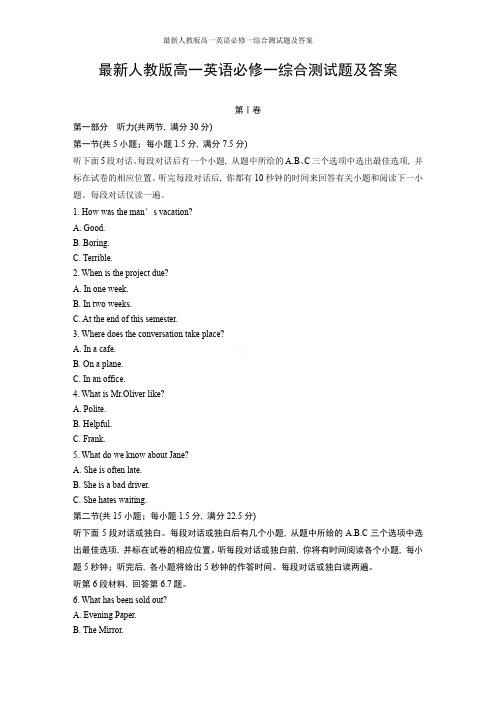
最新人教版高一英语必修一综合测试题及答案第Ⅰ卷第一部分听力(共两节, 满分30分)第一节(共5小题;每小题1.5分, 满分7.5分)听下面5段对话。
每段对话后有一个小题, 从题中所给的A.B、C三个选项中选出最佳选项, 并标在试卷的相应位置。
听完每段对话后, 你都有10秒钟的时间来回答有关小题和阅读下一小题。
每段对话仅读一遍。
1. How was the man’s vacation?A. Good.B. Boring.C. Terrible.2. When is the project due?A. In one week.B. In two weeks.C. At the end of this semester.3. Where does the conversation take place?A. In a cafe.B. On a plane.C. In an office.4. What is Mr.Oliver like?A. Polite.B. Helpful.C. Frank.5. What do we know about Jane?A. She is often late.B. She is a bad driver.C. She hates waiting.第二节(共15小题;每小题1.5分, 满分22.5分)听下面5段对话或独白。
每段对话或独白后有几个小题, 从题中所给的A.B.C三个选项中选出最佳选项, 并标在试卷的相应位置。
听每段对话或独白前, 你将有时间阅读各个小题, 每小题5秒钟;听完后, 各小题将给出5秒钟的作答时间。
每段对话或独白读两遍。
听第6段材料, 回答第6.7题。
6. What has been sold out?A. Evening Paper.B. The Mirror.C. London Times.7. How much is a copy of Youth Daily?A. One dollar.B. Two dollars.C. Three dollars.听第7段材料, 回答第8、9题。
人教版高中英语必修一全册同步练习+单元测试(含答案)

Unit 1Section ⅡWarming Up & Reading—Language Points同步练习Ⅰ.单句语法填空1.It is on the farm where we worked together that we got to know each other.2.While playing (play) with his children outdoors, the father felt very happy.3.I have to believe that encouragement is so powerful (power) that it can change a person.4.It was no pleasure watching (watch) the football match at home alone, so I went to the bar.5.In my opinion, he didn't hurt you on purpose.6.Having set down all that the teacher required, he set about doing (do)the experiment following the teacher's instruction.7.As far as I'm concerned (concern), riding bicycles is a good solution.8.Hearing what father had said, the crying child soon calmed down.9.Not until he went through real hardship did he realize the love we have for our families is important.10.It was the second time that he had visited (visit) the farm.Ⅱ.单句改错1.After the earthquake, the people set out rebuilding their homes.out→about或rebuilding→to rebuild2.While climbed the mountain, we enjoyed the warm sunshine and a beautiful view.climbed→climbing3.It was on my way to school where I met Mary last night.where→that4.It is the first time that she had got the chance to travel abroad.is→was或had→has5.The boy wasted an entirely morning in playing computer games. entirely→entire6.It's no good talk without doing anything.talk→talkingⅢ.阅读理解You know how wonderful you are, and you know that others know how wonderful you are, but what do you do when admiration crosses over the line into jealousy (嫉妒)? For most teens there will come a day when you realize that one of your friends is jealous and that this jealousy is hurting your friendship. When this happens it can seem like there is nothing that you can do, but the good news is that there is.Don't let jealousy spoil your friendship. Deal with it confidently and you might be back to normal much sooner than you think.It can be hard to walk up to a friend and ask them what the problem is, but if you want to save your friendship you'll have to do just that.Don't approach them and ask why they are jealous of you unless of course you want to appear totally conceited (逞能的), just take some time alone with them and let them know that you've been feeling like there's been something coming between you.If they refuse to respond, then use the opportunities to explain how you have been feeling.Chances are that something you say will strike a nerve and your friend will open up as well.When you figure out what is annoying your friend, ask him or her what (s)he thinks would make the situation better. If, for example, (s)he says that (s)he feels like (s)he doesn't get to spend any time with you because of your being off with your new friends from the swim team then maybe you could invite him or her along the next time or block off one day a week for just the two of you.Remember, though, that whatever solution you decide on should be a compromise.Don't limit your own talents or opportunities simply because your friend is unhappy.Try instead to include him or her in your new life and see how that works out.Even the best of friendships can be ruined by jealousy.This destructive emotion is rarely productive and can turn best friends into worst enemies.Before taking extreme action, chat with your jealous friend to see if the two of you can work out a compromise.If you can't, be prepared to know exactly how far you will go to keep your friend and how far you won't.【解题导语】本文是关于人际关系的话题。
人教版高中英语必修1各单元练习题+答案

必修1Unit 1FriendshipⅠ. 单词拼写1. When we learn English, it is quite important to develop the ability of (交际).2. Failing in the examination again (使心烦) her a lot.3. Those who are in difficult s usually work harder to get out of it.4. As an e of the newspaper, I should be responsible for what is printed in it.5. He was punished by the school because of his c in the exam.Ⅱ. 用方框内所给单词或短语的适当形式填空1. His mother his future and his happiness.2. We tried to her , but she kept shouting and crying.3. You will have to go over these figures again, they don’t right.4. I have everything that happened in my diary.5. The old man many sufferings during the war.6. How are you your classmates in the new school?7. A lot of new questions at the meeting yesterday.Ⅲ. 翻译句子1. 他不应该告诉汤姆这个秘密,但是他没有恶意。
(should have done)2. 孩子们安全到达了山顶。
(形容词作状语)3. 这是我们第一次来到山村去见那些无家可归的孩子。
高中英语同步练习册习题
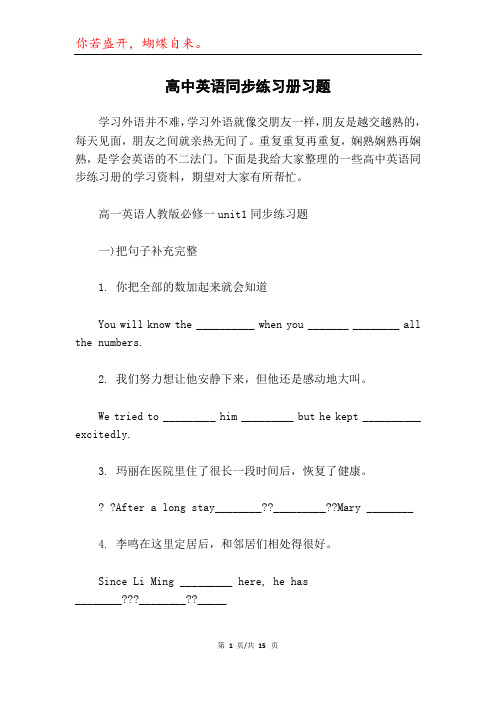
高中英语同步练习册习题学习外语并不难,学习外语就像交朋友一样,朋友是越交越熟的,每天见面,朋友之间就亲热无间了。
重复重复再重复,娴熟娴熟再娴熟,是学会英语的不二法门。
下面是我给大家整理的一些高中英语同步练习册的学习资料,期望对大家有所帮忙。
高一英语人教版必修一unit1同步练习题一)把句子补充完整1. 你把全部的数加起来就会知道You will know the __________ when you _______ ________ all the numbers.2. 我们努力想让他安静下来,但他还是感动地大叫。
We tried to _________ him _________ but he kept __________ excitedly.3. 玛丽在医院里住了很长一段时间后,恢复了健康。
After a long stay_________________Mary ________4. 李鸣在这里定居后,和邻居们相处得很好。
Since Li Ming _________ here, he has________________??______________??his neighbours.5. 假如你不想和我在一起,你就整理东西走人。
If you don’t want to stay with me, you can _______??_______ and go.6.??战斗期间,我受了许多苦。
我用日记登记自己的经受,以便老了以后能够记住。
During the war, I ________ a lot. I wrote my diary to________??________ my___________,? ?so I would __________??them when I was old.二)填入所缺的词。
1.It was quite terrible. It took me some time to c______ down myself.2.Parents are always c_______ much about their children.3.True friends always s______ their sadness and happiness with each other.4.Im terribly sorry. I didnt do it on p__________.5. Some animals hibernate under snow, because there is much air in l______ snow.6. A_______ to the law, t_______ are not allowed to smoke or drink.7. The old man went t_______ many wars and s_____ a lot from them.8. After the terrible hurricane, the whole house was destroyed e________.9. If you have some trouble, you can go??to the teacher for a_________.10. By internet, we can c_________ with people all over the world c_________.11. By now, he has formed the h______ of doing some reading before going to bed.12. The r_____ he gave for his c_____ in the exam was simple.三)选择填空--- Mary’s got crazy and has been sent to the mental hospital. Did you tell her boss about that?--- Yes, but I _____ her husband first.A. should have toldB. shouldn’t have toldC. must have toldD. needn’t have toldThere was ______ time _____ Chinese used foreign oil.A. a; whenB. a; whileC. /; whenD. /; while3.It was because of bad weather __________ the football match had to be put off.A. soB. so thatC. whyD. that4.---Look! The telephone is broken. Someone damaged it ________ purpose.---That may be right. But perhaps it was broken _________ accident.A. on; byB. by; byC. on; onD. by; on5. What great trouble we had ___________ where his house was.A. in findingB. to findC. findD. found6. Some students have trouble _____ grammar while others have difficulty______ new words.A. in; rememberB. for; to rememberC. on; rememberingD. with; remembering7. I cannot spend ________ money on the car which is________ expensive for me.A. too much; much tooB. far too; too muchC. much too; too muchD. too many; much too8.catch the first bus, he got up very early this morning.A. In order toB. In order thatC. So as toD. So that9. There are altogether 6 people in the room, thebaby________.A. includeB. includingC. includedD. to include10. The manager of the factory told us that very little ______ was made of the waste material in the past.A. costB. valueC. useD. matter高一英语必修一同步练习Unit 3 Travel journal1. Ladies and gentlemen, please fasten your seat belts. The plane_____. (2023全国高考题)A. takes offB. is taking offC. has taken offD. took off2. —Are you still busy? (2023年浙江卷)—Yes, I______ my work, and it won’t take long.A. just finishB. am just finishingC. have just finishedD. am just going to finish3. -What would you do if it _____ tomorrow? (2023全国高考题)-We have to carry it on, since we’ve got everything ready.A. rainB. rainsC. will rainD. is raining4. --- Did you tell Julia about the result?---Oh, no, I forgot. I her now. (2023全国 III )A. will be callingB. will callC. callD. am to call5. Since I won the big prize, my telephone hasnt stopped ringing. People ____to ask how I am going to spend the money. (2023湖南卷)A. phoneB. will phoneC. were phoningD. are phoning6. I will visit you if Father ______ me.A. letB. letsC. is lettingD. will let7. Look out! That tree _____ fall down.A. is going toB. will beC. shallD. would8. My uncle _____ to see me. Hell be here soon.A. comesB. is comingC. had comeD. came9. When ______ school begin?Next Monday.A. hasB. doesC. didD. is going to10. Every time I _____ there, I will buy him something nice.A. wentB. will goC. goD. have gone11. We wont go unless you ______ soon.A. had comeB. cameC. will comeD. come12. The air liner from Beijing _____ at 3:00 p.m.A. is about to arriveB. has arrivedC. arrivesD. is going to arrive13. I dont know when he ______, but when he ______, Ill let you know.A. will come/comesB. comes/will comeC. comes/comesD. will come/will come14. ---Did you write to Grace last summer?---No, but Ill ______ her over Christmas vacation.A. be seenB. have seenC. be seeingD. to see15. ---I’m going to the States?---How long ___ you___ in the States?A. are; stayedB. are; stayingC. have; stayedD. did; stay16. I’ve won a holiday for two weeks to Florida. I ____ my mum.A. am takingB. have takenC. takeD. will have taken17. Selecting a mobile phone for personal use is no easy take because technology ____ so rapidly.A. will changeB. has changedC. will have changedD. is changing18. --- You’ve left the light on.---Oh, I have. ___ and turn it off.A. I goB. I’ve goneC. I’ll goD. I’m going19. --- Is this raincoat yours?.---No, mine____ there behind the door.A. is hangingB. has hungC. hangsD. hung20. --- What’s that terrible noise?---The neighbours____ for a party.A. have preparedB. are preparingC. prepareD. will prepare21. Because the shop ____, all the T-shirts are sold at half prices.A. has closed downB. closed downC. is closing downD. had closed down22. --- Can I join the club, Dad?--- You can when you ___ a bit old.A. getB. will getC. are gettingD. will have got23. I feel it is your husband who ___ for the spoiled child.A. is to blameB. is going to blameC. is to be blamedD. should blame24. At this time tomorrow, ____ over the Atlantic.A. we’re going to flyB. we’ll be flyingC. we’ll flyD. we’re to fly25. ---Are you still busy?--- Yes, I my work, and it won’t take long.A. just finishB. am just finishingC. have just finishedD. am just going to finish26. ---Did you tell Julia about the result?--- Oh, no, I forgot. I ____ her now.A. will be callingB. will callC. callD. am to call27. ---What are you going to do this afternoon?--- I’m going to the cinema with some friends. The film ___ quite early, so we ___ to the bookstore after that.A. finished; are goingB. finished; goC. finishes; are goingD. finishes; go高一下册英语同步练习题一、单词拼写1.She is _________ young to understand the book.2.His back was badly i_____________ in the war.3.When he heard the news that his father was trapped in the ruins, he b__________ into tears.4.The police made effort to r___________ the people who were trapped underground.5.Tom’s car was completely d____________ in the accident.6.J_________________ from his accent, we know he comes from the county.7.Keep the children away from the_________________________(电)8.Though badly _________________( 受惊的), she appeared outwardly calm.9.She seemed to take pleasure in our _____________( 苦痛)10.His death was a great _________________(震动) to us.11.Queer_________ the news seemed, it is true.12.Little ________ I think he was a spy .13.He is such a good person that we all think _____________ of him .14.People now attempt to use solar energy to take thep____________ of electricity.15.They are d__________ out the truth behind the news.单词拼写1.too2. injured3. burst4. rescue5. destroyed6. Judging7. electricity8. shocked9. pain10.shock 11. as 12. did 13. highly 14. place 15. digging二、重点短语1.立即, 立刻 _______________2. 爆发 __________________3.结束 ___________________4. 一片废墟 ________________5. 发觉掘出 ______________6. 很多, 大量_______________7. 凭….推断 ______________ 8. 为了纪念________________9. 为….做预备 ______________ 10. 成千上万_________________11.分发 _______________ 12.轻视, 不重视 _______________13.从某地挽救 ________________ 14. 口语竞赛_________________15. 坚持 ___________________ 16. 阻挡某人做某事______________17.代替, 而不是________________ 18.为…而骄傲_________________19.似乎 ____________________ 20. 突然笑起来________________高中英语同步练习册文档内容到此结束,欢迎大家下载、修改、丰富并分享给更多有需要的人。
人教版高中英语必修第一册课后习题 Unit 1 Section A
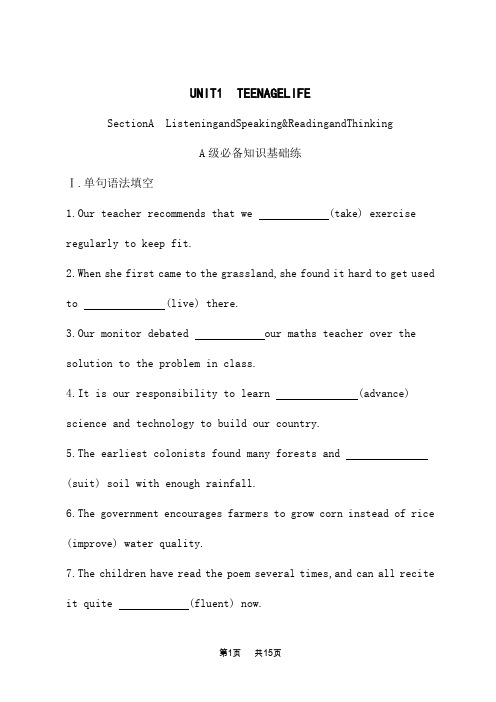
UNIT1 TEENAGELIFESectionA ListeningandSpeaking&ReadingandThinkingA级必备知识基础练Ⅰ.单句语法填空1.Our teacher recommends that we (take) exercise regularly to keep fit.2.When she first came to the grassland,she found it hard to get used to (live) there.3.Our monitor debated our maths teacher over the solution to the problem in class.4.It is our responsibility to learn (advance) science and technology to build our country.5.The earliest colonists found many forests and(suit) soil with enough rainfall.6.The government encourages farmers to grow corn instead of rice (improve) water quality.7.The children have read the poem several times,and can all recite it quite (fluent) now.8.After (graduate) from college,he first worked ina government office,and then in a travel agency.9.The little baby whale was (obvious) stuck and could not move and his life was in danger.10.I quickly lowered my head to avoid looking directly into his eyes so he doesn’t feel (challenge).Ⅱ.短语填空1.Ordinary soap,used correctly,can bacteria effectively.2.Almost ten years has passed since I Shandong University.3.I love technology and try to it so I can relate to my students.4. his sister,Jerry is more easily troubled by relationship problems.5.In order to enrich her knowledge,my sister a distance-learning course.6.The teacher blamed me yesterday afternoon for not havingthe classroom.7.The company hired several college students toleaflets to people on the street.8.My sister is a middle school student and shelistening to some light music before sleep.Ⅲ.翻译句子1.为了增强体质,我强烈建议你参加一些户外活动。
- 1、下载文档前请自行甄别文档内容的完整性,平台不提供额外的编辑、内容补充、找答案等附加服务。
- 2、"仅部分预览"的文档,不可在线预览部分如存在完整性等问题,可反馈申请退款(可完整预览的文档不适用该条件!)。
- 3、如文档侵犯您的权益,请联系客服反馈,我们会尽快为您处理(人工客服工作时间:9:00-18:30)。
第一节单项填空(共20小题,每小题0.5分,满分10分)21. ---Have you seen _____ pen? I left it here this morning.---Is it ______ black one? I think I saw it somewhere.A. a; theB. the; theC. the; aD. a; a22. Though _____ to see us, the professor gave us a warm welcome.A. surprisingB. was surprisedC. surprisedD. being surprised23. John’s success has nothing to do with good luck. It is years of hard work _____has made himwhat he is today. A. why B. that C. when D.which24. It was the second time we _____ in holding such important parties.A. succeedB. had succeededC. succeededD. have succeeded25. ---You are always full of ______. Can you tell me the secret?---Taking plenty of exercise every day.A. powerB. strengthC. forceD. energy26. He said that he had visited the World Expo ______.A. two weeks beforeB. last weekC. a week agoD. before twoweeks27. --- Do you think it’s a good idea to make friends with your students?--- _____, I do. I think it’s a great idea.A. ReallyB. ObviouslyC. ActuallyD. Generally28. Ten minutes has been made full _____ of ______ the problem.A. use; to studyB. using; studyingC. to use; to studyD. use; studying29. The general _____ that they seize the city before dawn.A. hopedB. decidedC. announcedD. commanded30. A great number of students______ said they were forced to practice the piano.A. to questionB. to be questionedC. questionedD. questioning第二节:完形填空(共20小题,每小题1分, 满分20分)You Did More Than Carry My BooksMark was walking home from school one day when he noticed a boy ahead of him had dropped all of the books he was carrying, along with a baseball bat and several other things. Mark 41 down and helped the boy pick up these articles. 42 they were going the same way, he helped to carry some of them for him. As they walked Mark 43 the boy's name was Bill, that he 44 computer games, baseball and history, that he was having a lot of 45 with his other subjects and that he had just broken 46 with his girl friend.They arrived at Bill's home first and Mark was 47 in for a Coke and to watch some television. The afternoon passed 48 with a few laughs and some shared small talk, and then Mark went home. They 49 to see each other around school, had lunch together once or twice, and then both ended up from the same high school. Just three weeks before 50 , Bill asked Mark if they 51 talk. Bill 52 him of the day years ago when they had first met. “Do you 53 wonder why I was carrying so many t hings home that day?” asked Bill. “You see, I54 out my locker because I didn't want to leave a mess (脏乱)55 anyone else. I had planned to run away and I was going home to 56 my things. But after we spent some time together 57 and laughing, I realized that 58 I had done that, I would have 59 a new friend and missed all the fun we would have together. So you see, Mark, when you picked up my books that day, you did a lot more. You 60 my life.”41. A. fell B. sat C. lay D. knelt42. A. Although B. Since C. After D. Until43. A. discovered B. realized C. said D. decided44. A. played B. loved C. tried D. made45. A. questions B. ideas C. trouble D. doubt46. A. up B. out C. off D. away47. A. called B. helped C. invited D. allowed48. A. peacefully B. willingly C. freely D. pleasantly49. A. continued B. agreed C. forced D. offered50. A. graduation B. movement C. separation D. vacation51. A. would B. should C. could D. must52. A .demanded B. reminded C. removed D. asked53. A. ever B. usually C. even D. never54. A. checked B. took C. cleaned D. put55. A. over B. into C. with D. for56. A. find B. pick C. pack D. hold57. A. talking B. playing C. reading D. watching58. A. before B. if C. while D. as59. A. forgotten B. passed C. left D. lost60. A. helped B. recovered C. improved D. changed第三部分:阅读理解(每小题2分,满分40分)AWhen I was a boy, I belonged to the Boy Scouts(童子军),so I used to go camping every summer, and once something happened which I have never been able to explain.We were camping in a place above a river. After arriving, we all rushed down to the river and had a swim. Standing by the river, we noticed that it was surrounded by cliffs (悬崖).If someone wanted to reach the river at this point, he had to walk past our camp.Several days later, the scoutmaster had to be away for a day. That afternoon, we had supper early. We were sitting round the fire, eating and talking, when a man walked past and went down towards the river. We all felt that this man looked very strange, but, because each of us was afraid of looking very stupid, no one said anything.We ate rather slowly, taking as long as possible. After finishing, we collected our plates together so that we could take them to the river where we always washed them. But no one moved towards the river, we stood looking at each other ashamed. Then all shouting at once, we began talking about the man who had walked past us. We agreed how strange he looked and we wondered what he could be doing by the river. We knew that he could only return by passing through our camp.An hour passed. Then one of the boys suggested we should creep(悄悄移动)down by the river so that we could see what the man was doing. Moving very slowly and keeping in the shadow, we crept down towards the bank. One boy climbed a tree so that he could see everything clearly. He called to us that there was no one there, so we ran down to the bank, looking everywhere carefully. We could not understand where the man had gone.When it got dark, we went back to our camp feeling bewildered. We told the scoutmaster what had happened in the evening. Smiling, he doubted that we had seen the man, but finally suggested we go and look again. We did, but there was no one there.Many years have passed, but I still remember it as if it were yesterday. What did we see? I do not know. 61. The writer in the text mainly tells us _________.A. the story of his childhoodB. a strange camping experienceC. about a stranger by the riverD. about a good place for camping62. Why did the boys eat their supper slowly?A. They wanted to delay going to the river bank.B. They were waiting for their scoutmaster.C. They had a supper earlier than usual.D. They were talking while eating.63. The underlined word “bewildered” in the text probably means _________.A. ashamedB. nervousC. unable to understandD. eager to know something64. When he heard what had happened, the scoutmaster __________.A. realized who the man wasB. started to worry about the manC. went back to look for the canD. felt it hard to believe the boys65. The writer still remembers the event because________.A. the boys acted foolishlyB. the camping place is beautifulC. there has been no explanation for the eventD. he particularly enjoyed his camping that summer.BSu Hua is studying at Cambridge, UK. She has bought a bicycle and is worried about security. Her friend, Kate, found this article and sent it to her.IntroductionA lot of crime is against bicycles. About 150,000 bicycles are stolen every year and most are never found. You can prevent this happening by following a few careful steps.Basic SecurityDo not leave your bicycle in out-of-the-way places. Always lock your bicycle when you leave. Secure it to lampposts or trees. Take off smaller parts and take them with you, for example lights and saddles(车座).LocksGet a good lock. There are many different types in the shop. Buy one that has been tested against attack. Ask for a recommendation from a bike shop.MarkingSecurity marking your bike can act as a deterrent to a thief. It can also help the police find your bicycle. It should be clearly written and include your postcode and your house or flat number. This will provide a simple way to identify your bicycle.RegistrationThere are a number of companies who will security mark your bicycle for you. They will then put your registration number and personal details on their computer database. Then if your bicycle is found it will be easy to contact you.FinallyKeep a record of the bicycle yourself: its make, model and registration number. You can even takea photograph of it, this will prove the bicycle belongs to you.66. Which part of the article gives you information on how to lock up your bicycle when youleave it?A. LocksB. MarkingC. RegistrationD. Basic Security67. The underlined phrase “act as a deterrent to a thief” means__________.A. help you recognize your bikeB. help the police find your bicycleC. stop someone stealing your bicycleD. stop you worrying about your bike68. The article advises you to keep a record of your bicycle ____________.A. in the bike shop and your computerB. in a police station and security companyC. in a security company and your universityD. by yourself and in a security company69. Which of the following statements is true?A. More than 150,000 bicycles are stolen every year.B. Leave your bicycle inout-of-the-way places.C. Taking a photograph of your bike will help prove the bicycle belongs to you.D. Always lock your bicycle even if you don’t leave.70. The main purpose of this article is _____________.A. to tell you what to do if your bicycle is stolenB. to suggest ways of keeping yourbicycle safeC. to give you advice on where to buy a good lockD. to say why you shouldn’t keep your bicycle in a quiet placeCChildren have their own rules in playing games. They seldom need a referee(裁判) and rarely trouble to keep scores. They don’t care much about who wins or loses, and it doesn’t seem to worry them if the game is not finished. Yet, they like games that depend a lot on luck, so that their personal abilities cannot be directly compared. They also enjoy games that move in stages, in which each stage, the choosing of leaders, the picking-up of sides, or the determining of which side shall start, is almost a game in itself.Grown-ups can hardly find children’s games exciting, and they often feel puzzled at why their kids play such simple games again and again. However, it is found that a child plays games for very important reasons. He can be a good player without having to think whether he is a popular person, and he can find himself being a useful partner to someone of whom he is ordinarily afraid. He becomes a leader when it comes to his turn. He can be confident, too, in particular games, that it is his place to give orders, to pretend to be dead, to throw a ball actually at someone, or to kiss someone he has caught.It appears to us that when children play a game they imagine a situation under their control. Everyone knows the rules, and more importantly, everyone plays according to the rules. Those rules may be childish, but they make sure that every child has a chance to win.71. What is true about children when they play games?A. They can stop playing any time they like.B. They can test their personal abilities.C. They want to pick a better team.D. They don’t need rules.72. To become a leader in a game the child has to _________.A. play wellB. wait for his turnC. be confident in himselfD. be popular among hisplaymates73. What do we know about grown-ups?A. They are not interested in games.B. They find children’s games too easy.C. They don’t need a reason to play games.D. They don’t understand children’s games.74. Why does a child like playing games?A. Because he can be someone other than himself.B. Because he can become popularamong friends.C. Because he finds he is always lucky in games.D. Because he likes the place where he playsa game.75. The writer believes that ____________ .A. children should make better rules for their gamesB. children should invite grown-ups to playwith themC. children’s games can do them a lot of goodD. children play games without reasonsDBetty and Harold have been married for years. But one thing still puzzles old Harold. How is it that he can leave Betty and her friend Joan sitting on the sofa, talking, go out to a ballgame, come back three and a half hours later, and they’re still sitting on the sofa? Talking?What in the world, Harold wonders, do they have to talk about?Betty shrugs, Talk? We’re friends.Researching this result called friendship, psychologist Lillian Rubin spent two years interviewing more than two hundred women and men. No matter what their age, their job, their sex, the results were completely clear: women have more friendships than men, and the difference in the content and the quality of those friendships is “marked and unmistakable.”More than two-thirds of the single men Rubin interviewed would not name a best friend. Those who could were likely to name a woman. Yet three-quarters of the single women had no problem naming a best friend, and almost always it was a woman. More married men than women named their wife/husband as a best friend, most trusted person, or the one they would turn to in time of emotional distress(感情危机). “Most women, ”says Rubin, “identified(认定)at least one, usually more, trusted friends to whom they could turn in a trouble moment, and they spoke openly about the importance of these relationships in their liv es. ”“In general,”writes Rubin in her new book, “women’s friendships with each other rest on shared emotions and support, but men’s relationships are marked by shared activities.”For the most part, Rubin says, interactions(交往)between men are emotionally controlled―a good fit with the social requirements of “manly behavior. ”“Even when a man is said to be a best friend,”Rubin writes, “the two share little about their innermost feelings. Whereas a woman’s closest female friend might be the first to tell her to leave a failing marriage, it wasn’t unusual to hear a man say he didn’t know his friend’s marriage was in serious trouble until he appeared one night asking if he could sleep on a sofa. ”76. What old Harold cannot understand or explain is the fact that__________.A. he is treated as an outsider rather than a husbandB. women have so much to shareC. women show little interest in ballgamesD. he finds his wife difficult to talk to77. Rubin’s study shows that for emotional support a married woman is more likely to turnto__________.A. a male friendB. a female friendC. her parentsD. her husband78. According to the text, which type of behavior is NOT expected of a man by society?A. Ending his marriage without good reason.B. Spending too much time with hisfriends.C. Complaining about his marriage trouble.D. Going out to ballgames too often.79. Which of the following statements is best supported by the last paragraph?A. Men keep their innermost feelings to themselves.B. Women are more serious than menabout marriage.C. Men often take sudden action to end their marriage.D. Women depend on others in making decisions.80. The research done by psychologist Rubin centers around__________.A. happy and successful marriagesB. friendships of men and womenC. emotional problems in marriageD. interactions between men and women。
